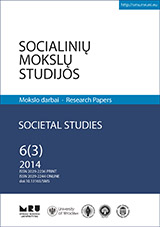Akademinis integralumas: nuo abstraktaus kalbėjimo apie akademinį sąžiningumą – prie jo vadybos
Academic Integrity: From Abstract Talking to Particular Management
Author(s): Nijolė VasiljevienėSubject(s): Education
Published by: Mykolas Romeris University
Keywords: academic integrity; integrity management; ethics infrastructure; ethics codes; academic ethics
Summary/Abstract: The paper deals with the analysis of academic integrity concept and its wider application possibilities in Lithuanian universities. It provides the analysis of ethics institutionalization problems in the field and relates the ways of their resolution through academic integrity management. The aim of the paper is to reveal that integrity in organization activity has definite meanings and to prove that integrity is valid when transferring from abstract talking to real building of academic integrity is taking place. The author also explains that the realization of academic integrity is stipulated by proper organizational processes, ethics infrastructure and presupposed by effective value management systems, which enforce operationalization of outstanding aims of higher education. The author traces existing in Lithuanian higher school structures social cultural attitudes that determine mental and institutional barriers for integrity concept establishing. She argues that instrumental application of academic integrity diminishes the gap between declared values and facts, as well as between established ethics norms and their realization in institutional practice. Thus, integrity management helps to eliminate academic misconduct and still existent multiple facts of academic dishonesty. If such situation remains, the value of higher education decreases. That is why the formation of academic integrity assures the way to improve the situation. The paper generally raises the seminal problem of academic ethics institutionalization in Lithuanian higher schools and offers building the system, in which the society could trust in and rely on higher school diploma, university credentials and competencies of university graduates as prospective professionals. The paper offers to build academic integrity in Lithuanian higher school institutions by transferring the focus from individual integrity to the organizational one, while purposively forming corporative integrity through implementation of definite organisational processes and procedures. Only complex formation of integrity culture can surmount academic dishonesty, so it requires systems approach to the struggle against academic fouls, reconstruction of appropriate organization processes, creation of required integrity promotion procedures as well as its consistent implementation by using all managerial tools.
Journal: Socialinių mokslų studijos
- Issue Year: 6/2014
- Issue No: 3
- Page Range: 535-556
- Page Count: 22
- Language: Lithuanian

